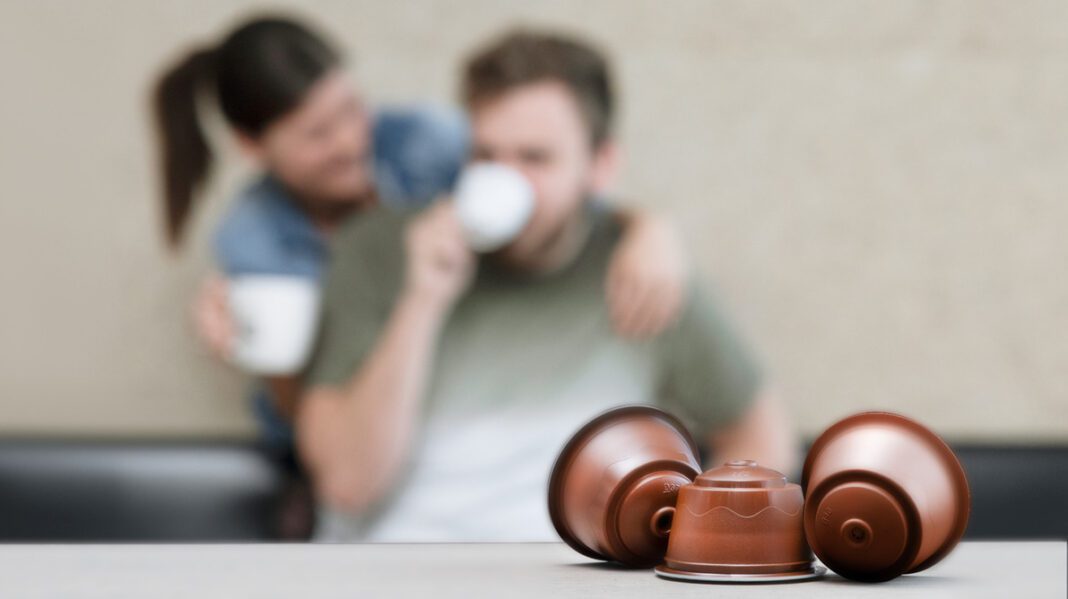MILAN, Italy – Coffee capsule machines are becoming more and more popular. According to Statista, the number of Americans who have a single-serve brewing machine increased by 40% in 2020. Even though convenience and growing quality are the driving forces behind capsule sales, the environmental impact is slowly become an important purchasing factor to consider.
The popolarity of coffee capsules
However, waste is one of the biggest raising problems when it comes to coffee capsules. As a response to this concern, companies started to develop reusable coffee pods that can be refilled many times.
There are various types of coffee pods. Natalie Hancock, the co-owner of Maverick Coffee, defines compostable capsules.
Compostable capsules
She says: “Compostable materials can be placed in soil to break down, but they have to decompose into matter which benefits the soil. The materials also have to break down relatively quickly to be certified compostable, usually at the same rate as food or garden waste.”
To be considered as such, capsules must break down within a maximum of six months according to the European EN 13432 industrial composting standards.
Even though all compostable coffee capsules are biodegradable, not all biodegradable materials are compostable.
Biodegradable capsules
“Biodegradable refers to any material that will disintegrate in water, soil, or air over time, with the help of bacteria and enzymes,” Natalie explains: “This can happen quickly or it can take years. ” Some capsules can break down into microplastics.
Jean-Michel Palagos, the founder of Evergreen Capsules. “There can be strong doubts over the actual biodegradability rates of some capsules,” he says. “Certain studies have found that some capsules did not biodegrade as much as the company states.”
Reusable capsules
“Reusable capsules have been developed to tackle waste issues and make using a coffee capsule machine more environmentally friendly,” Natalie says. “Usually, reusable capsules are made from stainless steel,” Natalie explains. “You can wash them out after each use, so they’re ready for the next brew.”
“Sometimes reusable capsules have foil or stainless-steel lids so you can fill the capsules with the coffee of your choice,” she says.
The future for reusable coffee pods
Natalie Hancock further explains the two types of customers who prefer reusable pods: “Firstly, there are the customers looking for a quick cup of coffee,” she says. “Convenience is their main priority when brewing coffee, and capsule machines have been designed with these types of consumers in mind.
“Secondly, there are coffee drinkers who want convenience, but they also want to make their coffee drinking experience as ‘green’ as possible”.
However, she also explains that customers need to be educated on how to use the best practices. Considering how reusable coffee capsules are a more sustainable option, it comes as a surprise the fact manufacturers still face problems when producing them.
“You have to be conscious of the coffee you use in reusable capsules; the grind size, roast profile, and pressure applied in the machine will all affect the end result,” Jean-Michel explains.
The facts to consider
Grind size is particularly important for capsule extraction. To achieve outstanding results, coffee for capsules must be ground using a roller mill to an optimal size.
“For some coffees, especially 100% arabica specialty-grade coffees, we found that it is more difficult to achieve a higher quality extraction because of the 5g capsule capacity,” Jean-Michel says.
“Evergreen Capsules started selling single-use foil lids, which allows for more coffee to be placed inside the reusable capsule,” he explains. “This enhances the intensity of the coffee.”
Natalie also explains the future for reusable capsules. “Larger capsule manufacturers don’t particularly want consumers to know that reusable capsules exist,” she tells me. “Naturally, they want to keep selling their own single-use pods.
“We hope that as more consumers look for sustainable capsule options, they will discover reusable capsules and more people will make the switch.”
It is entirely possible that in the future reusable capsules market experience will grow significantly over the next years.


















